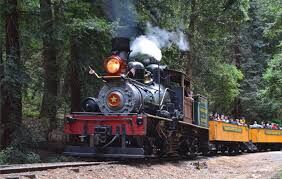Walking through the grounds of Roaring Camp Railroads in Felton, one is met with the sights and sounds of a family-friendly environment. Youngsters blow wooden train whistles as they chase each other through the grass. Families enjoy a picnic lunch at the wooden tables, and couples walk hand-in-hand over the bridge past the pond. And yet…and yet. Masks are in abundance, and are now a requirement to visit the historical site that began carrying tourists to the top of Bear Mountain, and down to Santa Cruz, in 1875. Hand sanitizer dispensers dot the area, and present-day signage (made with an appealing rustic look) reminds visitors of social distancing protocols.
It’s been a struggle to reinvent this tourist attraction in the Covid-19 era. It was necessary to cancel events, reduce train ride bookings to allow for social distancing, and disallow vendors whose livelihoods depend on barbecuing lunches, painting faces or turning visitors into cartoon works of art. Roaring Camp finally opened up about a month ago, and the tourists started to return.
Leatha Brown is a sales coordinator and events manager for Roaring Camp. She’s been with the company for seven years, and sees the impact of Covid-19 on the business. “Everything’s been canceled—all of our weddings, corporate, group and team building events—you name it. Some weddings have been tentatively rescheduled for the fall, but we’re still in a holding pattern. We have legacy events that happen here—Day Out with Thomas, the Redwood Mountain Fair, the Sol Fest, the Food Truck Challenge, the Saw Music Festival—that have all been canceled.” So how does a business that relies on so many large-scale events remain solvent in a pandemic economy? “We just recently started running our steam trains again, and our beach train on the weekends. We can’t operate at full capacity; we’re down from 200 seats per train to 70 seats to allow for social distancing. 2021 will be our 60th year of operation, and we’re hoping we can celebrate that anniversary with the community.” Brown says staff was furloughed when the virus first appeared in Santa Cruz County, but with the PPP loan (Paycheck Protection Program from the Small Business Administration), there haven’t been any layoffs. The other saving grace for Roaring Camp employees has been the awarding of the Great Plates program by the County of Santa Cruz. A total of five local businesses (Back Nine Grill and Bar, Johnny’s Harborside, Pearl of the Ocean, Swing Time Catering and Roaring Camp) were selected by a committee to deliver over 1,000 healthy meals to seniors each day, and employees are paid through a federal economic stimulus. “There are a lot of seniors who haven’t left the house since the pandemic took hold, and some say it’s the only meal they have all day,” says Brown.
As we meander through the grounds, Brown points out the number of precautions that staff are taking to protect visitors and employees alike. “We have signage everywhere, and we wipe down every part of the train between each departure. You’ll also find staff regularly disinfecting bathrooms, picnic tables and all touchable surfaces.” I mention the additional expense that the business must have incurred from the virus; Brown nods. “We have literally spent thousands of dollars on signage, masks, gloves and cleaning supplies. We also have a check-in station at the entrance by the bridge where staff ask a series of questions before guests are allowed in. It’s been a major transition for all of us.”
Phil Reader, engineer and steam engine fireman (note: not firefighter), has been working on the railroad for 40 years, and became part of the Roaring Camp family in 1979. He’s seen the impact of coronavirus on his beloved hometown railroad. “We used to see a lot of people out here recreating, and now they can’t. It’s been kind of depressing,” he says.
Donnie Sage has been a Roaring Camp conductor and fireman for six years, and is rolling with the changes brought on by pandemic. “Most people are just happy to be out of the house and on the train,” says Sage, in between announcements aboard the Bear Mountain steam train such as:
• “Redwood trees get 40% of their annual moisture from coastal fog.”
• “The traditional whistle signal for approaching a crossing is Morse Code for “Q” which was commonly used in the UK to announce the approach of the queen.”
• “Redwood root systems are as long as the tree is tall.”
While steaming our way up the 8.5% grade to the top of the mountain, Sage asks how many people are from out of town. Some hands go up, with the majority belonging to a group of eight people from Ft. Lauderdale. “We’d had this trip booked for two years, and we weren’t about to miss it,” says Lori Freeman. Aware that Florida has had skyrocketing infection rates of 10,000 – 15,000 new cases per day, the railroad’s efforts at social distancing and disinfecting are particularly welcome.
“We don’t know when things will open back up again, but we can’t wait,” says Brown. “We’re aware that it depends on the governor and the county, and we’ll be relieved when we can get back on track.”
She took the words right out of my mouth.













